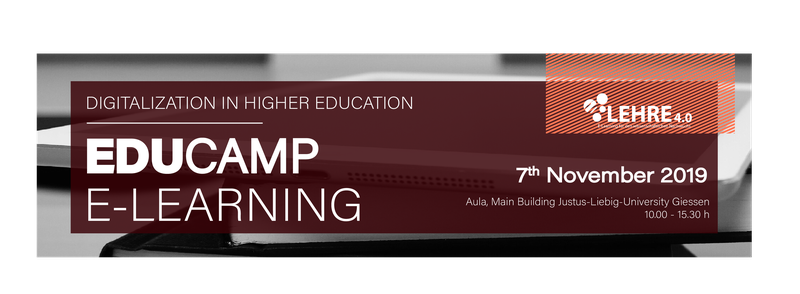Lehre 4.0 | EduCamp E-Learning (german/english)
- https://www.uni-giessen.de/en/faculties/research-centers/ggs/teaching/current-offers/winter-term-2019-20/lehre-4-0-educamp-e-learning
- Lehre 4.0 | EduCamp E-Learning (german/english)
- 2019-11-07T10:00:00+01:00
- 2019-11-07T15:30:00+01:00
Nov 07, 2019 from 10:00 to 03:30 (Europe/Berlin / UTC100)
Aula, JLU main building, Ludwigstr. 23, D-35390 Giessen
Hochschullehrende, Interessierte und Angehörige der Justus-Liebig-Universität
Virtual and augmented reality, mobile learning, E-Assessments, inverted and flipped classroom, digital learning environments, learning and content management systems, OER, legal issues and data protection in E-Learning, MOOCs or web based trainings - digitization has been entering into university teaching and affects all faculties in different ways. Digitally supported teaching and learning methods, tools and formats are intended to make teaching at the universities easier and more effective. However, the assignment should not be a means to an end, but rather meaningfully enrich the courses (didactically) and contribute to the further development of quality-assured university teaching.
Often we see or hear promising and new digital tools and formats or exciting digitally supported teaching scenarios, but mostly only individual actors experiment at the universities and there is a lack of secure knowledge and proven scenarios in connection with didactic, technological and organizational scope of digital teaching concepts. Here we would like to start with our EduCamp.
Procedure
| 10.00 | Warming Welcome |
| 10.15 | Plenary by Michael Eichhorn (studiumdigitale) |
| 11.00 | Session Planning |
| 11.15 | Break |
| 11.30 | 1st Round Session |
| 12.30 | Break |
| 13.30 | 2nd Round Session |
| 14.30 |
Wrap Up & Conclusion |
What is an EduCamp?
The project Lehre 4.0 - E-Learning for junior scientists is testing the interactive and open event format EduCamp for the first time. The format is similar to a barcamp, except that the focus is on the use of new media and digital forms and methods in higher education. At the beginning the participants determine the contents and the program themselves. There are different theme tables per session - what is being discussed there is decided by the participants in the plenum. Finally, the results of the individual round tables will be presented again in plenary.
Bring in your ideas, projects, questions, experiences and insights on the topic of digital university teaching, find fellow combatants, exchange ideas with other university lecturers and interested parties. As it is customary for the EduCamp conference format, you, as a participant, choose the content and the program yourself. There is no ready-made programming. Find out which topics of digital higher education other members of the JLU are involved in and make new contacts, learn something new from everyday teaching and exchange ideas about new and exciting topics in digital teaching!
Specials
|
Michael Eichhorn (studiumdigitale, Goethe-University Frankfurt) opens the EduCamp with a lecture by asking "Welche digitalen Kompetenzen brauchen Hochschullehrende?" and thus provides initial inspiration and impulses for finding a topic for the sessions.
Michael Eichhorn, Michael Eichhorn, Dipl-Ing., M.A., studied media technology at the University of Mittweida and media education at the University of Rostock. Since 2014 he has been working as a research associate at Goethe University Frankfurt in the field of media didactics at studiumdigital, the central eLearning institution. His research focuses on the digital skills of teachers, formal and informal learning processes in the network and digital accessibility. |
The team of Bosseln & Kallen provides sandwiches and steals for a snack in between during lunch break. Take advantage of this opportunity and get to know participants from other departments and look beyond the borders of one's own specialist area culture. Exchange with colleagues or deepen existing contacts. The lunch break gives you time to network.
This event is primarily held in German. Nevertheless, you are of course cordially invited to participate and ask questions and comment in English.
Here you find our our registration form.
